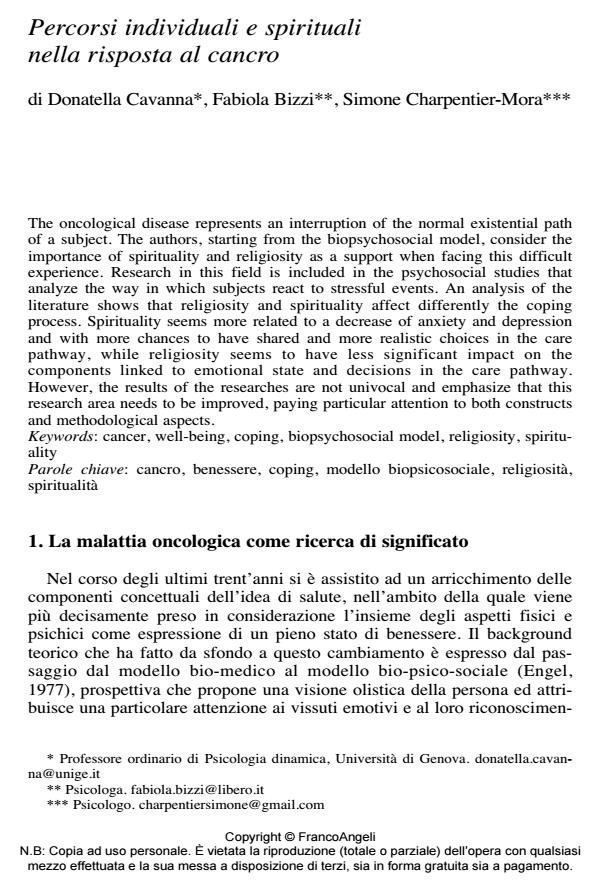Percorsi individuali e spirituali nella risposta al cancro
Titolo Rivista SALUTE E SOCIETÀ
Autori/Curatori Donatella Cavanna, Fabiola Bizzi, Simone Charpentier-Mora
Anno di pubblicazione 2015 Fascicolo 2015/2
Lingua Italiano Numero pagine 15 P. 143-157 Dimensione file 87 KB
DOI 10.3280/SES2015-002011
Il DOI è il codice a barre della proprietà intellettuale: per saperne di più
clicca qui
Qui sotto puoi vedere in anteprima la prima pagina di questo articolo.
Se questo articolo ti interessa, lo puoi acquistare (e scaricare in formato pdf) seguendo le facili indicazioni per acquistare il download credit. Acquista Download Credits per scaricare questo Articolo in formato PDF

FrancoAngeli è membro della Publishers International Linking Association, Inc (PILA), associazione indipendente e non profit per facilitare (attraverso i servizi tecnologici implementati da CrossRef.org) l’accesso degli studiosi ai contenuti digitali nelle pubblicazioni professionali e scientifiche.
The oncological disease represents an interruption of the normal existential path of a subject. The authors, starting from the biopsychosocial model, consider the importance of spirituality and religiosity as a support when facing this difficult experience. Research in this field is included in the psychosocial studies that analyze the way in which subjects react to stressful events. An analysis of the literature shows that religiosity and spirituality affect differently the coping process. Spirituality seems more related to a decrease of anxiety and depression and with more chances to have shared and more realistic choices in the care pathway, while religiosity seems to have less significant impact on the components linked to emotional state and decisions in the care pathway. However, the results of the researches are not univocal and emphasize that this research area needs to be improved, paying particular attention to both constructs and methodological aspects.
Parole chiave:Cancro, benessere, coping, modello biopsicosociale, religiosità, spiritualità
- Spiritual Well-Being and Mental Health During the COVID-19 Pandemic in Italy Ilaria Coppola, Nadia Rania, Rosa Parisi, Francesca Lagomarsino, in Frontiers in Psychiatry 626944/2021
DOI: 10.3389/fpsyt.2021.626944 - Exploring Staff Nurses’ Lived Experiences of Resilience in Relation to Spirituality during the COVID-19 Pandemic Cherish Delight Mahinay, Jason Manaois, Mary Rachelle Wapano, in Journal of Interdisciplinary Perspectives /2024
DOI: 10.69569/jip.2024.0227
Donatella Cavanna, Fabiola Bizzi, Simone Charpentier-Mora, Percorsi individuali e spirituali nella risposta al cancro in "SALUTE E SOCIETÀ" 2/2015, pp 143-157, DOI: 10.3280/SES2015-002011